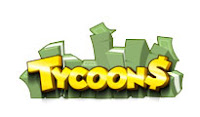 Lately I've been playing a game on Facebook called Tycoons. It's a simulation of the business world, where you buy businesses and harvest what it produces to be sold to the market or used as upkeep (resources used) of your other businesses. You can likewise upgrade businesses to produce more in a given amount of time, lessen its upkeep, or increase the maximum capacity it can hold (very useful when you can only be online a few times during the day). Production continues even when you are offline, much like in many browser-based games.
Lately I've been playing a game on Facebook called Tycoons. It's a simulation of the business world, where you buy businesses and harvest what it produces to be sold to the market or used as upkeep (resources used) of your other businesses. You can likewise upgrade businesses to produce more in a given amount of time, lessen its upkeep, or increase the maximum capacity it can hold (very useful when you can only be online a few times during the day). Production continues even when you are offline, much like in many browser-based games. What I like about Tycoons is that the decisions you make in the game affects the entire system, as your production impacts on the demand and supply of resources in the market. That means your value changes over time and you have to be aware of what's going on in the market. It also forces you to look into the businesses you have and decide if they are worth keeping or you need to replace them.
Also, there are a number of choices and strategies on how to proceed in the game. You can choose to be self-sufficient, producing the resources you need to produce other products, or you can risk it and go to the market everytime you need something. This removes to a point the "linearity" of progression. With a considerable number of sectors and several businesses within each sector, you can have your own unique strategies and continuously adjust them.
Businesses also has enough capacity so that they can continue producing for a minimum of 12 hours (provided it has the needed resources) before it gets to full capacity and has to stop producing. I can set up the businesses in the morning, stocking up on needed resources and still have it running by the time I can get to check it again in the afternoon or early evening.
On the other hand, a number of features in the game reduces its dynamism. The most significant one is the creation of a single sector that can "produce" population. Since the game has a feature called Tax Revenue, where you earn a certain amount of tax continuously depending on the size of your population (which was placed by the way as a means for players to recover should they made wrong choices early on and squandered their resources), it becomes now a race to own population-producing businesses. At a certain point, the game becomes automated as you start to switch off your other businesses in favor of businesses that produces population. Granted that it takes time before you can sustain this type of business, nevertheless it allows those who already can afford those businesses to just simply accumulate cash and even play the market at the expense of everyone else.
Still, the game is fun, especially at the start, and it offers a change from the usual types of Facebook games. It can even teach a thing or two about business and economics, although you can't expect it to behave like how real economies would. The game is still in beta and hopefully, it will still improve in the future.
Check out the game and let us know what you think.


